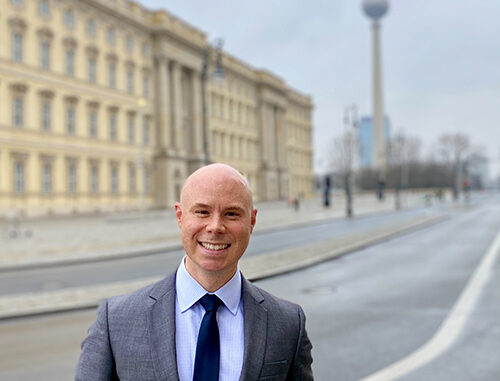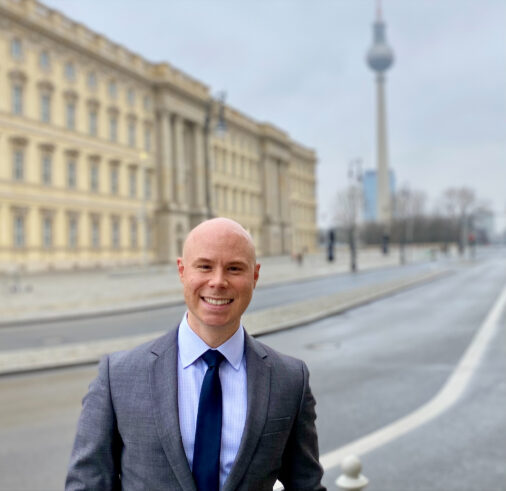

In this article, ESMT Berlin MBA alumnus and senior technical project manager at Allianz SE, Ryan Krog, explains how his experiences during the MBA prepared him for the first year of his new international career and shares 5 tips for those starting new roles overseas.
Navigating new horizons: Taking on the challenges of an international career
Embarking on an international MBA was a strategic choice for me, fueled by a desire to expand my perspectives and grasp opportunities beyond my home country, the United States. The allure of the diverse, global student body at ESMT and the promise of opening doors to international opportunities were particularly compelling. Now, as I approach the one-year mark of my post-graduation journey, I reflect on the rewarding, yet challenging, experience of working in a new country following an MBA. My objective is to offer guidance and insights to potential MBA students interested in embarking on their own international journey, acknowledging the varied backgrounds of ESMT students, some with extensive global experience and others, like me, who are navigating these waters for the first time.
5 tips for succeeding in your international career
1. Seek feedback early and often
Starting a new job in a foreign setting can be daunting. The common uncertainties when beginning a new role about performance and team integration are amplified in a different cultural context. At times, I have been surprised at how much this uncertainty impacted me, having enjoyed a great deal of comfort in my previous roles. I found that seeking proactive feedback from colleagues and managers is vital. It’s not merely for reassurance but to gauge your standing and identify areas for improvement. This practice was refined during my time at ESMT through several in-depth career coaching sessions as well as peer feedback review sessions throughout coursework and consulting project. Throughout these experiences, the lesson is clear: feedback is a two-way street to also understand cultural nuances, proving to be crucial for adapting and excelling in new environments.
2. Take initiative to build cultural connections
Working in a new country entails exciting opportunities to develop new professional connections with international colleagues. It is incredibly rewarding to build international connections, but it may require deliberate effort to forge them. Learning the local language, even when the business language is English, is an important step toward better integration. This effort is more than a communication tool; it’s a sign of respect and a willingness to immerse yourself in the culture of your new colleagues.
Prior to my MBA, I had already taken some German courses. As part of the program, ESMT offered supplemental coursework and recommended language learning apps, which I incorporated into my routine. I’ve enjoyed many moments practicing my German skills with my colleagues over coffees and lunches at the office, experiences that have not only strengthened our bonds but also enhanced my integration into the local culture.
3. Focus on clear communication
Navigating the subtleties of communication across different languages and cultures requires adaptability. To prevent misunderstandings, it’s beneficial to adopt a clear, direct communication style, using simpler language. This approach is particularly effective in multicultural settings, where you might have colleagues across many countries, ensuring your message is conveyed accurately. During the MBA, the common use of academic prose necessitated an adjustment in my personal writing and speaking styles for conversation, emails, and PowerPoint—especially in a diverse global environment where colleagues form different language backgrounds.
4. Build a professional network from scratch
A major challenge in an international career is developing a new professional network. While leveraging the global connections forged during your MBA is invaluable, ESMT itself plays a pivotal role in this process through its hosting of meetups and annual alumni events. These gatherings are not just reunions; they are dynamic platforms for professional development, offering direct access to a wide network of professionals across various industries. Beyond the ESMT community, actively engaging in local networking opportunities is essential for rebuilding your network in a new country. Attending local meetups, joining professional groups, and participating in community events broaden your exposure and understanding of the local business culture. These activities not only offer professional growth but also make the endeavor of understanding and integrating into a new environment more manageable and rewarding.
5. Adapt to different business practices
Each country presents unique business customs and practices, from decision-making processes to work-life balance norms. Observing and adapting to these differences is key, especially during the initial onboarding phase. What succeeds in one context may not in another. While the MBA curriculum at ESMT provides hands-on experience and theoretical knowledge on navigating cultural differences, it is the openness to new experiences and flexibility in adapting to unfamiliar work environments that are truly essential. However, it was the extensive time spent engaging with my classmates from around the globe, both within the academic setting and in social contexts, that fully equipped me to handle the complexities of international business. By embracing cultural variances, actively seeking understanding through questions, and being receptive to innovative methods of operation, I have found significant success in adapting to my new professional landscape.
Conclusion
Launching an international career post-MBA is an exhilarating yet demanding journey. The skills and experiences gained at ESMT, coupled with a willingness to adapt and continuously learn, are invaluable for navigating this path. If you’re contemplating an international career, view these challenges as opportunities for personal and professional growth. Should you seek further insights or have questions about transitioning to an international career post-MBA, I am here to share my experiences. Your global adventure awaits!
Ryan Krog, Senior Technical Project Manager, Group Data & AI Division at Allianz SE, MBA Alumnus 2023
